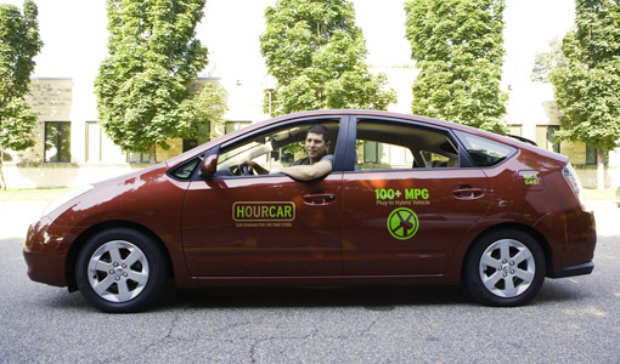Do the math. Most of us drive cars, and mosthouseholds own more than one. Each car costs its owner roughly $6,000-8,000 per year to own and operate. At the same time, consider that cars are used a total of two hours a day on average. How much do you pay for your car per hour of use? Is the cost of transportation and fuel worth the benefits of owning your cars?
Transportation and energy are two of the hottest issues in today’s news and business landscape. They are interrelated as well as closely linked to the environment – with obvious negative implications. These issues also are huge cost centers for businesses and individuals alike. Not only do cars, trucks and machinery cost money to operate, but they also produce pollutants, contribute to congestion and stress the infrastructure every moment they are used. To make matters worse, they only lose value through depreciation.
Even those businesses that aren’t concerned with global climate change or air quality acknowledge that problems such as pollution, rising fuel costs and crumbling, congestedroads take a bite out of their bottom line. Luckily, a Twin Cities nonprofit agency has found a sustainable solution by applying a little bit of “green” ingenuity to the equation – car-sharing. St. Paul-based HOURCAR is one of about 20 car-sharing programs perating in the United States today. Car-sharing is growing, reducing both the economic and ecological transportation costs borne by society, while providing immediate benefits for the consumer and commuter.
People can reserve cars by the hour instead of buying and maintaining their own vehicles. They make slight adjustments to their lifestyles, using public transportationto commute longer distances and walking and biking for short trips in their neighborhood.When car-sharers need to drive, they find that sharing cars is often more convenient, cheaper and “greener” than relying on their own cars.
With HOURCAR, members go online, choose one of 15 new hybrid cars, and make a reservation for as little as 30 minutes or for as long as they need. The car is stationedat a nearby HOURCAR hub with reserved parking. The member picks up the waiting car and returns it by the end of his or her reservation. The time and mileage logged duringthe trip are billed to the member at the end of the month. Gas, insurance, maintenance, parking and 24-hour support are all included. Members eliminate all the fixed costs of car ownership and save significant amounts on the variable costs, too.
The environmental impacts are remarkable as well. HOURCAR has several hundred members who, since joining, have reduced their driving by about 18 percent permonth. The combination of reducing driving and using fuel-efficient HOURCAR vehicles means that members burn 32 percent less fuel, eliminating almost a ton of carbondioxide emissions per member each year. And this is just what can be measured among the members. Fewer cars in the daily traffic stream contribute to better traffic flow and less rush-hour congestion. Every car on the road then consumes less fuel, further reducing greenhouse gas emissions. End result: cleaner air and lower traffic volume. Simple, personal decisions like this can make a big difference to anyone’s budget, and improves the quality of life for us all.
HOURCAR makes it easy for businesses of any size to reduce the size of their carbon footprint and join the green business movement. The hassles of commuting are virtually eliminated by using HOURCAR while at work. Workers don’t have to face traffic snarls in rush hour because they can ride light rail or the bus to work each day. They save on parking, too, because they don’t drive their own vehicle downtown. Getting around to meetings or appointments is simply a matter of making a reservation and walking to an HOURCAR hub nearby. (There currently are 10 hub locations in Minneapolis and five in St. Paul). Driving wherever you need to go is as convenient as ever.
For the last few centuries, business innovation has solved many of the problems we face as a society. Paradigm shifts and revolutionary products have steered us in newdirections when necessary. Changing the car culture in our country is going to take a revolution, but it is coming. HOURCAR, and car-sharing organizations like it are thenext step in that progression.





